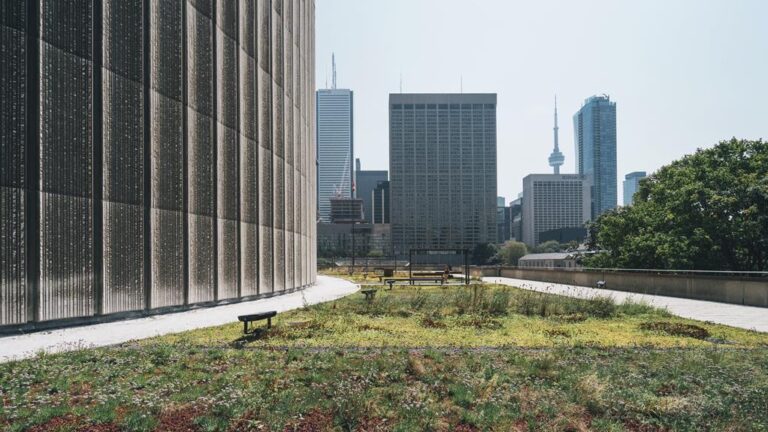Revamp Your Yard With Affordable Eco-Conscious Landscaping
Ready to transform your yard into an eco-conscious paradise? Get ready to revamp and reimagine your outdoor space with affordable and sustainable landscaping.
Discover the power of native plants, efficient irrigation systems, DIY composting, and recycled materials for creative hardscaping. Say goodbye to harmful chemicals and embrace natural pest control methods. It’s time to create a yard that not only looks stunning but also nurtures the environment.
Join the movement and belong to a community of conscious gardeners.
Native Plants for Low-Maintenance Landscaping
Use native plants for low-maintenance landscaping. When designing your yard, consider incorporating drought tolerant perennials and creating a wildlife friendly landscape.
Native plants are well-suited to your region’s climate and soil conditions, making them resilient and able to thrive with minimal upkeep. These plants have adapted to survive in your area, reducing the need for excessive watering or fertilizing. By using drought tolerant perennials, you can conserve water and save on maintenance costs.
Additionally, native plants provide essential food and shelter for local wildlife, inviting birds, butterflies, and other beneficial insects into your garden. This creates a sense of belonging for both you and the creatures that call your yard home.
Efficient Irrigation Systems for Water Conservation
Consider installing an efficient irrigation system to conserve water and maintain a sustainable yard.
With the advancements in smart sprinkler technology, you can now have a system that adjusts watering schedules based on weather conditions and soil moisture levels. This not only eliminates the need for manual adjustments but also prevents overwatering, saving water and reducing your water bill.
Another eco-friendly option to consider is rainwater harvesting. By collecting rainwater from your roof, you can store it in a tank and use it for irrigation purposes. This reduces the reliance on municipal water sources and ensures that your yard stays healthy even during dry spells.
With these efficient irrigation systems, you can easily take a step towards water conservation while still having a beautiful and flourishing yard.
DIY Composting to Enhance Soil Health
Enhance the health of your soil by creating your own compost. Indoor composting is a great way to recycle kitchen scraps and create nutrient-rich soil for your plants. Not only does it reduce waste sent to landfills, but it also provides a sustainable solution for organic gardening.
Vermicomposting, which involves using worms to break down organic matter, is a popular method for indoor composting. Simply set up a worm bin with a bedding material, such as shredded newspaper or coconut coir, and add your kitchen scraps. The worms will munch on the scraps and turn them into nutrient-rich castings, also known as worm compost.
This can be used as a natural fertilizer to enhance the health and vitality of your plants, giving you a sense of belonging to the natural cycles of life.
Recycled Materials for Creative Hardscaping
Transform your outdoor space with creative hardscaping using recycled materials. Incorporating upcycled furniture and reclaimed wood structures into your yard not only adds a unique touch but also promotes sustainability.
Upcycled furniture, made from repurposed materials such as old barrels or pallets, can be used as seating areas or decorative pieces. Reclaimed wood structures, such as pergolas or trellises, provide a rustic charm while reducing the demand for new timber.
These materials not only add character to your yard but also contribute to reducing waste and conserving resources. By utilizing recycled materials in your hardscaping projects, you can create a space that reflects your eco-conscious values and showcases your creativity while making a positive impact on the environment.
Natural Pest Control Methods for a Chemical-Free Yard
- Take simple steps to create a chemical-free yard by implementing natural pest control methods.
When it comes to maintaining a healthy and vibrant yard, it’s essential to find ways to control pests without resorting to harmful chemicals. One effective method is to encourage the presence of beneficial insects in your yard. These insects, such as ladybugs and lacewings, feed on common garden pests like aphids and caterpillars.
Planting flowers like daisies, marigolds, and yarrow can attract these beneficial insects, creating a natural pest control system. Another effective technique is companion planting, where you strategically plant certain crops together to repel pests. For example, planting basil near tomatoes can help deter aphids.
Conclusion
In conclusion, by incorporating native plants, efficient irrigation systems, DIY composting, recycled materials, and natural pest control methods into your landscaping, you can revamp your yard in an affordable and eco-conscious way.
Remember, ‘The best time to plant a tree was 20 years ago. The second best time is now.’ So, get started today and create a beautiful, sustainable yard that will benefit both you and the environment for years to come.






